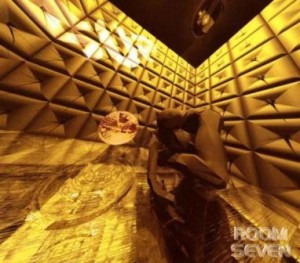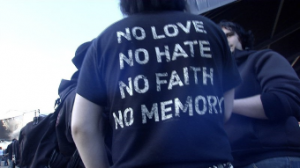
By the time 1997 rolled around Death Metal had all but returned to the primordial abyss from which it had emerged, and Black Metal had basically committed suicide. As if sensing the demise of extreme metal or unable to overcome the perceived expressive limitations of extreme metal, S.U.P. with an eye to their Heavy Metal and progressive rock influences, release a surprisingly expressive, intelligent and interesting album that could be referred to as industrial progressive death rock. Mid-paced, melancholy, unsettling, dreamlike and enigmatic, the listener of “Room Seven” is submerged into a world of varying and compelling experiences that often times work simultaneously to challenge and lift the listener beyond the simple, linear and emotive reactions that arise from rock and other forms of popular music. Despite some of the heavy metal fist pumping riffs and the common and accessible themes, “Room Seven” does a great job of placing the listener in a relative position of omniscience and thus introducing a position from which to contemplate and apply the wisdom of this release to one’s own life.
Masters at presenting simultaneously varying and subtly different shades of a theme, SUP reminds those who have the ears to listen that life is more than the mere temporal, logical and linear succession of events and experiences. Rather the listener is urged to contemplate life as the compound and expression of various and seemingly disparate elements, working simultaneously to create the complexity of life and its experiences, while remaining fundamentally connected. Vocals themselves, while melodic are emotionally restrained, dreary and often times express a profound fatalism, stoicism or a dissinterested acceptance of the superior forces alluded to above. Although “Room Seven” remains a compelling listen, the heavy metal and rock based themes preclude the possibility of this album reaching the cosmic heights of certain Black Metal and Death Metal classics, nonetheless as a testament to the intricacies of the human experience this album offers satisfying insight.
-TheWaters
http://www.youtube.com/watch?v=mlPe8_cncws
No CommentsTags: death metal, Heavy Metal, Industrial, Progressive Death Metal

 The best news Majesty and Decay has to offer is Steve Shalaty’s drumming. The man has been replacing Immolation’s godly Alex Hernandez ever since 2005’s Harnessing Ruin but it is only here that he unlocks his true talent. Steve has surely developed his own musical language since 2007 and the band has finally regained its rhythmic “pillars”. Everything has fallen into place at last: blasting endurance, inventive drum breaks and mid-paced punishment. The “inverted” riffing – although not as all-pervasive as on, say, Close to a World Below, – stresses the drumming very nicely and allows for some smooth gliding down the interwoven landscape of melody. Indeed, what sets the album apart in the vast Immolation discography is the use of melody. While the band is still a riff-fed beast, the heavy metal melody injecting the solos and seeping through the riffs enriches the sound world of the group, introduces “humanity” to the demonic environment of their instrumentation. The songs are shorter compared to the classic 90s era material, more to-the-point composition-wise, and definitely more “human” than we have come to expect from these New Yorkers.
The best news Majesty and Decay has to offer is Steve Shalaty’s drumming. The man has been replacing Immolation’s godly Alex Hernandez ever since 2005’s Harnessing Ruin but it is only here that he unlocks his true talent. Steve has surely developed his own musical language since 2007 and the band has finally regained its rhythmic “pillars”. Everything has fallen into place at last: blasting endurance, inventive drum breaks and mid-paced punishment. The “inverted” riffing – although not as all-pervasive as on, say, Close to a World Below, – stresses the drumming very nicely and allows for some smooth gliding down the interwoven landscape of melody. Indeed, what sets the album apart in the vast Immolation discography is the use of melody. While the band is still a riff-fed beast, the heavy metal melody injecting the solos and seeping through the riffs enriches the sound world of the group, introduces “humanity” to the demonic environment of their instrumentation. The songs are shorter compared to the classic 90s era material, more to-the-point composition-wise, and definitely more “human” than we have come to expect from these New Yorkers. “Our threatened kingdoms The world is divided Trample ourselves While we claw for the prize”
“Our threatened kingdoms The world is divided Trample ourselves While we claw for the prize”

 Promised Land of Heavy Metal
Promised Land of Heavy Metal Cosmic Atrophy near completion of their second full length concept album, Montis Ex Dementia. Based on the work At the Mountains of Madness by H.P. Lovecraft, the album will be available soon on
Cosmic Atrophy near completion of their second full length concept album, Montis Ex Dementia. Based on the work At the Mountains of Madness by H.P. Lovecraft, the album will be available soon on 
